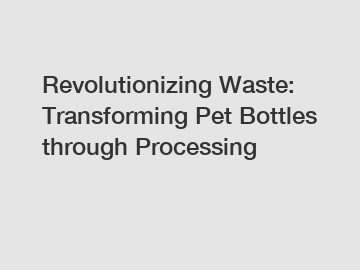Revolutionizing Waste: Transforming Pet Bottles through Processing
In our modern society, it has become increasingly crucial to address the pressing issue of waste management. One prominent concern is the disposal of millions of discarded PET bottles every day, which poses a significant threat to the environment. However, with the advent of innovative technologies, we now have the potential to revolutionize waste management and transform these PET bottles into valuable resources. In this blog, we will explore the revolutionary process of converting PET bottles through advanced processing methods.
Revolutionary Waste Management Process.
Traditional waste management practices often involve incineration or landfilling, both of which are detrimental to the environment and unsustainable in the long run. The process of transforming PET bottles offers a sustainable alternative, contributing to a circular economy that aims to minimize waste and maximize resource utilization.

1. Sorting and Collection: .
To begin the transformation process, efficient sorting and collection systems are essential. Advanced technology and automated machinery are used to sort and segregate PET bottles based on their color, shape, and size, ensuring high accuracy and productivity. This initial step lays the foundation for a streamlined recycling process.
2. Shredding and Washing:
Once sorted, the PET bottles undergo shredding, where they are reduced into smaller pieces. These shredded pieces are then washed thoroughly to eliminate any impurities or contaminants. Careful washing ensures that only clean PET flakes move further into the recycling process, maintaining the quality of the final product.
3. Decontamination:
The decontamination stage focuses on eliminating any remaining foreign particles, such as labels or adhesives, along with bacteria and other microorganisms. This step is crucial to meet strict safety and quality standards. Advanced machinery, including hot water baths, specialized chemicals, and powerful filters, ensure proper purification and decontamination of the PET flakes.
4. Reprocessing into Raw Materials:
After decontamination, the PET flakes are reprocessed into raw materials suitable for the production of a wide range of products. Through a process called polymerization, the flakes go through intense heat and pressure, transforming them into a molten form. This molten material is then molded into pellets, which can be used by various industries for creating new PET-based products such as fabrics, packaging materials, and synthetic fibers.
Benefits of Transforming PET Bottles.
The revolutionary nature of transforming PET bottles through advanced processing methods brings forth immense benefits to both the environment and the economy.
1. Environmental Impact:
By diverting PET bottles from landfills and incineration, recycling significantly reduces the carbon footprint associated with waste disposal. It conserves natural resources, curbs pollution caused by the production of new plastics, and reduces energy consumption. Moreover, recycling PET bottles significantly supports the preservation of wildlife habitats and marine ecosystems.
2. Economic Opportunities:
The circular economy created through PET bottle recycling generates numerous economic opportunities. Industries reliant on plastics as raw materials, including textiles, automotive, construction, and packaging, can reduce their production costs by utilizing recycled PET. Additionally, the recycling industry creates jobs at various levels, contributing to economic growth and sustainability.
3. Public Awareness and Engagement:
The impactful transformation process of PET bottles encourages public engagement and awareness regarding waste management. Education on the significance of recycling and the benefits it brings stimulates responsible consumer behavior. By actively participating in recycling programs, individuals can play a vital role in promoting sustainability and protecting the environment.
Conclusion.
The revolutionizing process of transforming PET bottles through advanced processing methods offers a sustainable approach to waste management. The process ensures efficient sorting, cleaning, and reprocessing, resulting in valuable raw materials that can be further utilized across multiple industries. By embracing this revolutionary technique, we can significantly reduce waste, minimize environmental harm, and create a prosperous circular economy.
As we move forward, it is essential to continue investing in advanced technologies, infrastructure, and public awareness to maximize the transformative potential of PET bottle recycling. Only through collective efforts can we achieve a cleaner, greener, and more sustainable future for generations to come. .
Want more information on rPET pellets, rPET pellets, rPET pellets? Feel free to contact us.
212
0
0

Comments
All Comments (0)